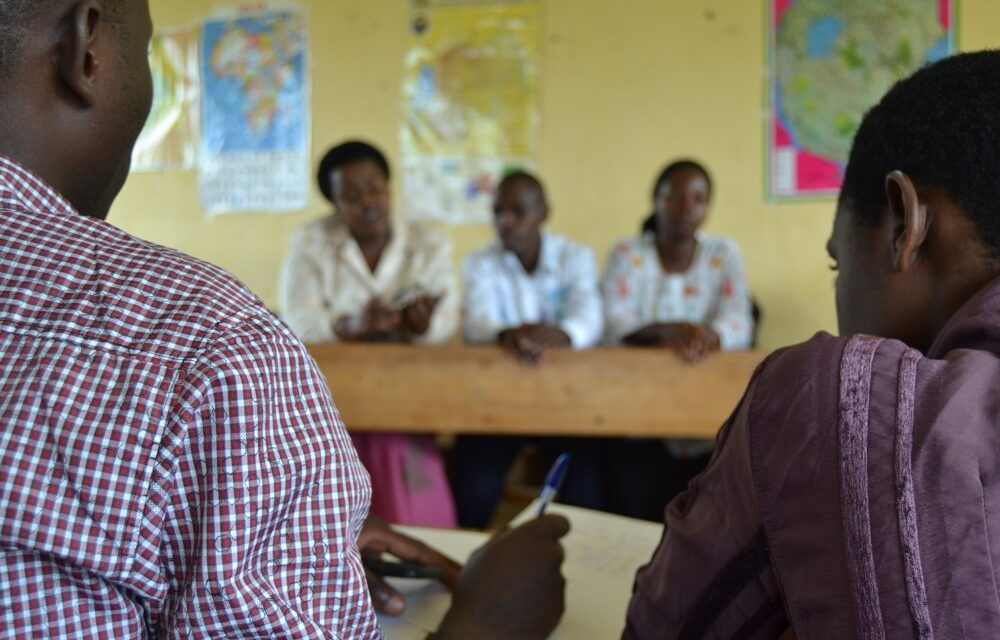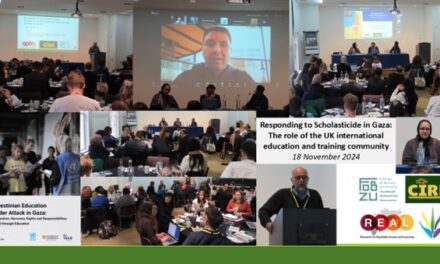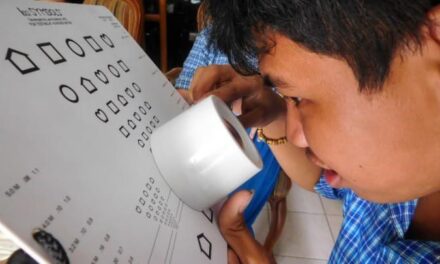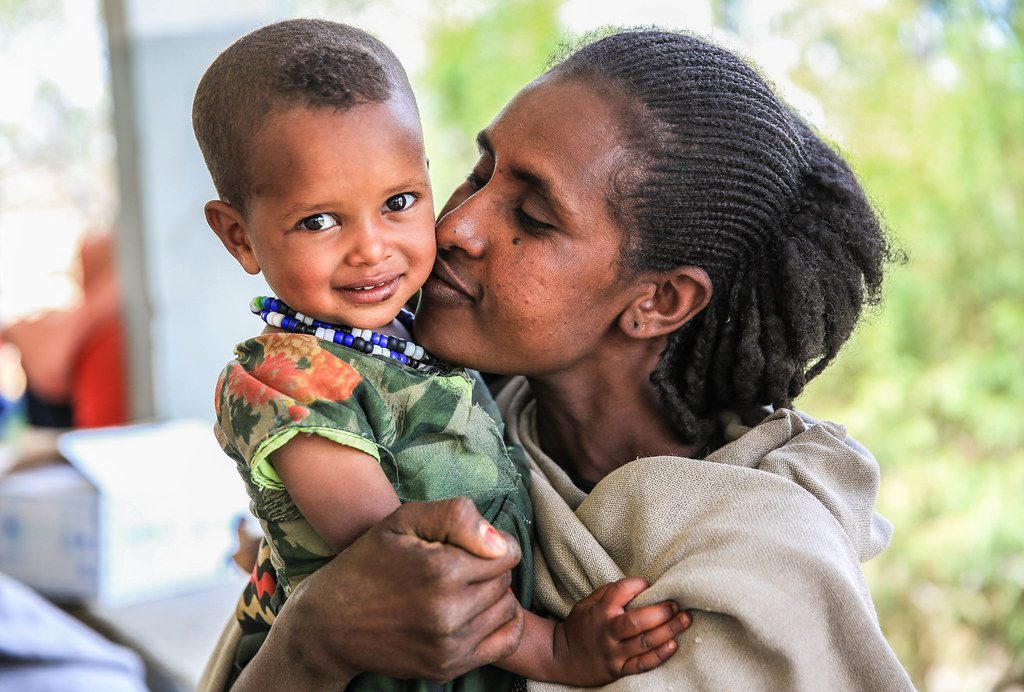This blog was written by Laterite and the Research for Equitable Access and Learning (REAL) Centre at the University of Cambridge. Laterite and the REAL Centre are learning partners on the Mastercard Foundation’s in Teaching initiative, responsible for generating evidence of improved teaching quality and student learning on a range of program activities in Rwanda. This blog has also been published on the Laterite website.
The Mastercard Foundation’s Leaders in Teaching initiative responds to the opportunities that a quality secondary education represents for the African continent. It supports teachers throughout their careers and prepares them to deliver high-quality, relevant education. The initiative focuses in particular on STEM subjects in Rwanda.
As learning partners on the initiative, Laterite and the Research for Equitable Access and Learning (REAL) Centre at the University of Cambridge are responsible for generating evidence of improved teacher quality and student learning on a range of program activities in Rwanda. This includes creating opportunities for implementing partners to learn from each other and identify opportunities for future research.
Laterite and the REAL Centre hosted a learning webinar with all Leaders in Teaching implementing partners to discuss the emerging implications of COVID-19 in July 2020. Over 50 attendees from across Rwanda discussed how they are adapting to the new context, the challenges they face, and the opportunity for Leaders in Teaching to play an even greater role in reshaping the future of secondary education in Rwanda.
The COVID-19 pandemic has affected programs to improve teaching quality in Rwanda
Education in Rwanda and around the world has been heavily disrupted by the COVID-19 pandemic. All schools in Rwanda have been closed since March 2020 to try to curb the spread of the virus. There is not yet a date for when schools will re-open, though there are plans to change the school calendar from January – November to September – June.
Teachers also face significant disruptions to their own professional development, from missing out on opportunities to practice their skills in the classroom, to having to delay training or placement opportunities. Preliminary data from a Laterite and REAL Centre phone survey of teachers during the pandemic suggests that most teachers have little or no experience with online teaching and remote learning platforms. This makes it difficult for them to support their students outside the classroom. It’s important that teacher professional development continues during this time so they are equipped to support students when schools re-open. Many of these students will have gone months without formal education.
Leaders in Teaching implementing partners are tasked with improving the quality of secondary teaching and learning in Rwanda. Like so many, they have had to adapt quickly to this changing context.
How are implementing partners adapting?
The pivot to remote learning is happening faster than planned
All partners have indicated that the transition to online learning and remote delivery has happened faster than planned. For some, this will include providing teachers and schools with laptops and batteries, supported by the Mastercard Foundation’s COVID-19 Recovery and Resilience Program. For others, it has meant digitizing training sessions or delivering school lessons via TV and radio stations. Partners have made impressive strides in developing and delivering remote learning content in a short period of time. There is a general consensus that blended learning is here to stay, so partners are working toward solutions that are sustainable in the longer-term.
Teacher and parent networks are playing an important role
A transition to remote learning has resulted in new networks emerging to support teacher and student development. For example, teachers are encouraged to use social media to engage with and learn from each other. This has created a community of practice that extends beyond school walls. Parents also have emerged as an important resource in encouraging their children to engage with and adapt to remote lessons.
What are some of the challenges partners continue to face?
While significant work has already been done to rapidly adjust programming to respond to the COVID-19 crisis, challenges remain.
Inclusive access to education is a concern
Blended learning provides the ability to reach many teachers and students simultaneously, but not all will have equal access to the technologies they need for remote learning. For example, teachers and students in remote areas are less likely to have access to the (mobile) internet, TVs, or radios in their homes so remote programming and learning are difficult. Teachers and students who need extra support, such as those with disabilities, face additional difficulties in accessing remote learning content.
Blended learning should not come at the expense of quality
Partners emphasized that the quality of education must remain high. Remote learning is an excellent resource, but it is less interactive than learning in the classroom and more difficult to assess. Teachers need to be able to practice their pedagogical skills in the classroom as they progress through continuous professional development programs. This is especially important at the secondary education level, where material is more complex.
How do the partners intend to address these challenges?
Collaboration is key
The learning webinar presented an opportunity for partners to come together, discuss common challenges, and brainstorm solutions. By sharing their experiences, partners were able to identify several potential synergies between their programs that would benefit secondary education and teaching quality in Rwanda. For example, several partners recognized that they could share resources to develop e-learning modules. This in turn will enable them to disseminate high-quality content as quickly as possible.
Research will play an important role
The discussion also revealed knowledge gaps that require further exploration, including:
- Understanding different methods of remote learning in low- and lower-middle-income country contexts. For example, how does remote delivery impact learning? Is it of high-quality?
- Understanding the impact of remote learning on inclusivity. For example, how many children and teachers do not have access to remote learning tools? What are the alternatives to reach them?
In the coming months, Laterite and the REAL Centre will work with implementing partners to strengthen learning around emerging education modalities with the goal of supporting teacher and student learning moving forward.
Leaders in Teaching brings together a range of implementing partners engaged in teacher support and training in Rwanda. This includes partners directly involved in teacher pre-service education (University of Rwanda College of Education (URCE)), teacher professional development (African Institute for Mathematical Sciences (AIMS), Inspire Educate and Empower (IEE), and VVOB Rwanda), and support to strengthen data-driven decision-making in education (Carnegie-Mellon University Africa (CMU Africa) and UNICEF Rwanda).
Laterite and the REAL Centre at the University of Cambridge are learning partners for the initiative, responsible for generating evidence of improved teacher performance and student learning, particularly for those who are most at risk. This evidence will be used to improve the initiative and provide lessons for other contexts.





